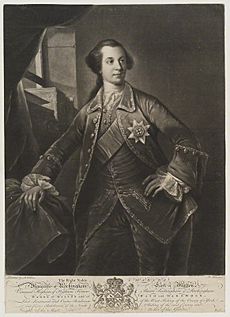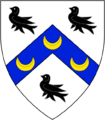Charles Watson-Wentworth, 2nd Marquess of Rockingham facts for kids
Quick facts for kids
The Most Honourable
The Marquess of Rockingham
|
|
|---|---|
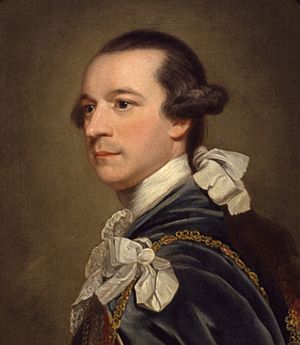
Detail of painting after Joshua Reynolds
|
|
| Prime Minister of Great Britain | |
| In office 27 March 1782 – 1 July 1782 |
|
| Monarch | George III |
| Preceded by | Lord North |
| Succeeded by | The Earl of Shelburne |
| In office 13 July 1765 – 30 July 1766 |
|
| Monarch | George III |
| Preceded by | George Grenville |
| Succeeded by | William Pitt the Elder |
| Personal details | |
| Born | 13 May 1730 Wentworth, Yorkshire, England |
| Died | 1 July 1782 (aged 52) Wimbledon, England |
| Resting place | York Minster, York, England |
| Political party | Whig |
| Spouse |
Mary Bright
(m. 1752) |
| Parent | Thomas Watson-Wentworth, 1st Marquess (father) |
| Alma mater | St John's College, Cambridge |
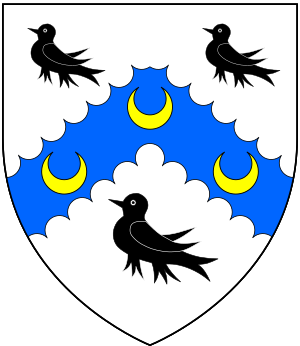
Charles Watson-Wentworth, 2nd Marquess of Rockingham (born May 13, 1730 – died July 1, 1782) was an important British politician. He was a member of the Whig party and served as Prime Minister of Great Britain twice. He was a very influential leader, even though he held high office for only about a year and a half in total.
Early Life and Adventures (1730–1751)
Charles Watson-Wentworth grew up at Wentworth Woodhouse in Yorkshire, England. He went to Westminster School.
When he was 15, a rebellion called the Jacobite rising of 1745 happened. A prince known as the "Young Pretender" tried to take over the throne. Charles's father made him a colonel and gathered volunteers to protect the country. Charles was very brave and rode to join the King's army without telling his parents! The King himself was impressed, calling Charles "as good a colonel as he has in his army."
In 1746, Charles's father became a marquess, a very high noble title. Charles then became known as the Earl of Malton. He traveled around Europe, learning about history and politics. He even met King George II, who thought Charles was a very promising young man.
Starting a Political Career (1751–1765)
On his 21st birthday in 1751, Charles inherited his father's large estates. This made him very wealthy, with an income of about £20,000 a year. He also gained control over several seats in Parliament, which meant he could help choose who became a Member of Parliament.
He gave his first speech in Parliament in 1752. It was about Scottish lands taken after the rebellion. He wanted these lands to be farmed by people who were peaceful and hardworking.
In 1752, he married Mary Bright and became a "Lord of the Bedchamber" to King George II. This was an honorary position. He also started a political group called the Rockingham Club, which had many members.
When a possible French invasion threatened Britain in 1756, Rockingham raised his own volunteer army. He even stopped riots in Sheffield without using military force, which showed his strong leadership. In 1760, he was made a Knight of the Order of the Garter, a very special honor.
When King George III became king in 1760, there were big changes in British politics. Rockingham was part of the Whig party, which had been very powerful. But the new King had his own favorite politicians. Rockingham felt that these changes were bad for the country. In 1762, he resigned from his position as Lord of the Bedchamber to protest the King's policies. He also lost some of his other important local titles.
Over the next few years, Rockingham became the main leader of the Whigs who opposed the King's new favorite politicians.
First Time as Prime Minister (1765–1766)
In 1765, the King's current Prime Minister was dismissed. After some talks, Lord Rockingham was asked to become Prime Minister. He got back all the honors he had lost earlier. He also chose Edmund Burke, a famous Irish thinker, to be his private secretary. They became lifelong friends and political partners.
Rockingham's time as Prime Minister was mostly focused on the American colonies. The British government had passed the Stamp Act 1765, which taxed many things in the colonies. The Americans were very unhappy about this. Rockingham wanted to get rid of the Stamp Act, and he succeeded in 1766.
However, he also passed another law called the Declaratory Act. This law said that the British Parliament had the right to make laws for the American colonies "in all cases whatsoever." This meant Britain still believed it had full control over America.
Because of disagreements within his government, Rockingham resigned after only about a year.
In Opposition (1766–1782)
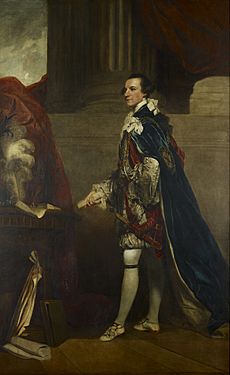
For the next 16 years, Rockingham was in the opposition. He strongly supported the rights of the American colonists. He believed that the King's power was growing too much and that it was a danger to Britain's freedom.
He wrote that the war against America could not be won. He felt that the government was corrupt and that this was bad for the country's future. He thought that a complete change in leadership and policies was needed.
Second Time as Prime Minister (1782)
In 1782, Rockingham became Prime Minister for a second time. One of his first actions was to push for the recognition of the United States as an independent country. This helped bring an end to the American War of Independence.
During this time, his government also passed "Gilbert's Act." This law aimed to help poor people by creating groups of parishes (local areas) to provide support and set up workhouses.
Rockingham's second term was very short. He died just 14 weeks later, in July, from an influenza illness. He was buried in the family vault at York Minster.
Legacy and Impact
After Rockingham's death, his estates went to his nephew, William Fitzwilliam, 4th Earl Fitzwilliam. Many of Rockingham's political friends looked to Fitzwilliam to continue their work.
Rockingham's political party, the Whigs, faced challenges after he died. They later split over disagreements about the French Revolution.
Places Named After Lord Rockingham
Many places are named after Lord Rockingham, especially in North America:
- In Canada:
- Rockingham, Nova Scotia
- In the United States:
Images for kids
See also
 In Spanish: Charles Watson-Wentworth para niños
In Spanish: Charles Watson-Wentworth para niños
 | Tommie Smith |
 | Simone Manuel |
 | Shani Davis |
 | Simone Biles |
 | Alice Coachman |


